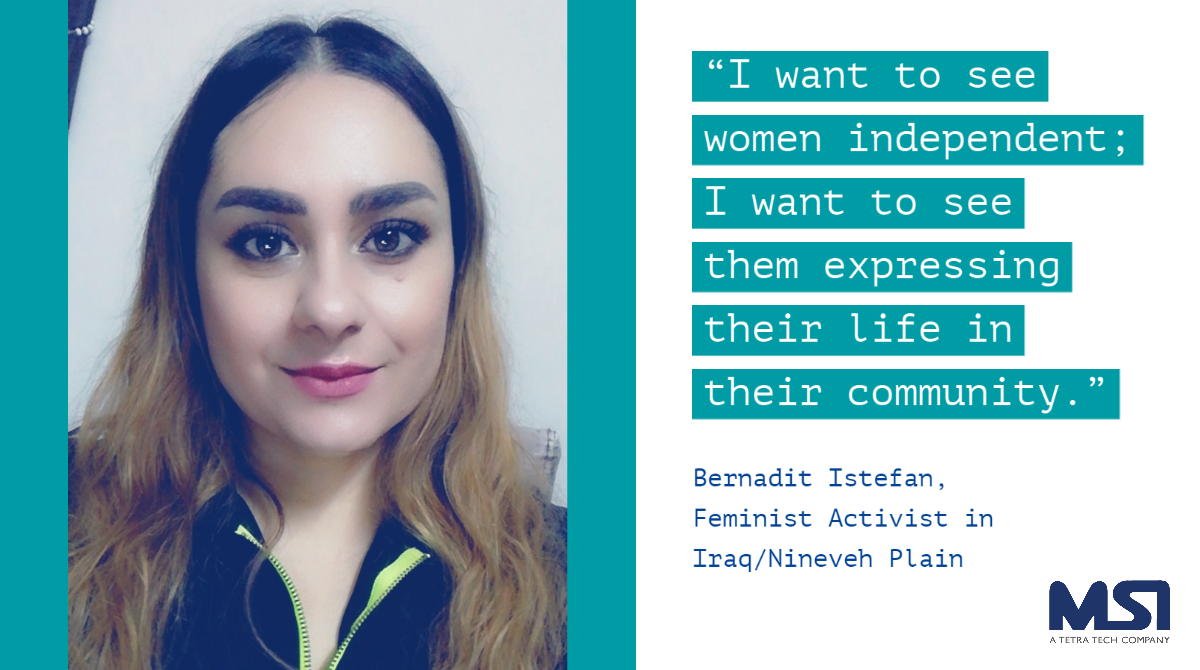
Iraqi women and girls from ethnic and religious minority communities – Christians, Yezidis and Shabak – in the Ninewa Plains survived ISIS terror. They are now trying to rebuild their lives. Progress is being made with the support of USAID’s Iraq Genocide Recovery and Persecution Response (GRPR) Learning & Pilots program and people like Bernadit Istefan.
As a program manager at the Baghdad Women Association (BWA), Bernadit works with women and girls from communities in northern Iraq affected by ISIS. The Association is one of MSI’s partners on the GRPR program. It works with information and communications technology specialists from Re:Coded to provide a safe space for women to learn photography, graphic design and computer skills to build a foundation for livelihood opportunities.
Bernadit feels connected to the women she works with, and it fuels her “desire to help women know their rights, to live in dignity.”
Bernadit’s story further fuels her connection. At 12 years old, her father abruptly moved the family from Baghdad to his village in Kurdistan, where she spent more than five years out of school. During that time, on a trip to Mosul, she passed by a university filled with students. She knew then that she wanted to attend one day.
But she was not allowed to enroll in elementary school because she was too old. Despite this challenge, she audited classes, studied on her own – and eventually passed her elementary exam. She even advocated with the Ministry of Education and enrolled in evening classes.
“I fought hard to get what I have gotten in my life. I did not reach anything without challenges…fighting and challenging circumstances to reach my goal.”
When she was 16, the family farm failed to produce crops. She, her sister and her mother fought for permission from her father to travel to Tel Kaif in the Ninewa Plains to work. The sisters took jobs in factories while their mother became an employee in a cell phone factory.
After many years, she successfully completed her secondary education and was accepted to study English in university at night. But Bernadit had to leave school for a year when her mother fell ill. She recalls the hurdles she faced along the way: long hours of factory work, a one-year engagement to a relative who did not support her education, Ministry of Education age restrictions, and her mother’s illness.
Each one alone could have been enough to scuttle her ambition to achieve a college education, but she did not give in. She recalls the strength and support of her mother, who said, “You will reach your goal because you have a desire, you want it.” Bernadit pursued the external study program that allows students who missed school to study on their own and then sit for their exams. She took her high school level exams successfully and then eventually graduated from university.
Bernadit now serves as a role model for other women. Speaking about the Iraq GRPR program, which works toward prevention of sexual and gender-based violence through women’s rights advocacy, community service and trainings, Bernadit says, “Awareness is good, gender-based violence case management services which BWA provides is good, but computer programming courses will give women the opportunity to start doing something with their life. It is good to give information, but to give you something to raise your capacity is more beneficial.”
Bernadit starts all of her leadership and advocacy trainings for BWA with words of encouragement:
“Don’t let anyone control your life. Control your own life. You have the right to make decisions about your life. You decide what you want.”
She speaks from experience. Since her own displacement 20 years ago, she has led a life of determination and self-reliance. “I want to see women independent; I want to see them expressing their life in their community.”
Learn more about MSI’s implementation of the Gender Recovery and Persecution Response program, and how we are supporting governance, fragility and stabilization in the Middle East.